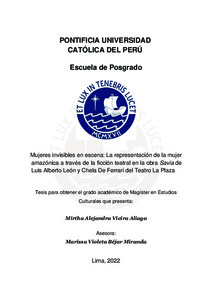Mujeres invisibles en escena: La representación de la mujer amazónica a través de la ficción teatral en la obra Savia de Luis Alberto León y Chela De Ferrari del Teatro La Plaza
Abstract
Esta tesis parte de un cuestionamiento sobre las implicancias de representar “la
otredad” en el teatro limeño, particularmente cuando se trata de grupos humanos
subalternos que suelen estar invisibilizados y cuyas representaciones con mayor
alcance tienden a ser generadas por miembros ajenos a su comunidad. En ese sentido,
este trabajo busca analizar cómo se realiza la representación de la mujer amazónica
en la obra Savia del Teatro La Plaza. Considero que es parte de nuestra
responsabilidad como artistas procurar poner en escena temas que requieran ser
pensados por nuestra sociedad. Sin embargo, se debe tener una conciencia particular
al hablar sobre algún grupo humano al que no pertenecemos. Para lograr este análisis,
en esta investigación se han descrito diferentes representaciones de la mujer
amazónica que aparecen en la obra y reconocido los elementos a través de los cuales
se compone dicha representación. Asimismo, se han identificado las problemáticas que
se dan en dichas representaciones desde la perspectiva de los estudios poscoloniales
y la teoría de la subalternidad, para finalmente examinar la forma en la que se construye
en escena empatía entre la historia contada y el público, para lograr conectar con y
visibilizar a las mujeres amazónicas. La metodología se centra en el análisis del texto
dramático de la obra y de la grabación de la puesta en escena. Esta investigación nos
brinda alcances sobre las complejidades de la representación de comunidades
subalternas, pues inclusive cuando se tratan de evidenciar los discursos racistas y
colonialistas, la obra puede hacer uso de estereotipos pertenecientes a dichos
discursos, pues son parte del imaginario de sus creadores. This thesis is based on a questioning about the implications of how "otherness" is
represented in the theater of Lima, particularly when it comes to subaltern human
groups that are usually invisible and whose representations with a greater reach tend
to be built by members outside their community. This research intends to analyze how
the representation of Amazonian women is portrayed in the play Savia of Teatro La
Plaza. I believe that it is part of our responsibility as artists to show on stage issues that
need to be addressed by our society. However, we must be specially aware of how we
portray human groups that we don’t belong to. To achieve this analysis, the different
representations of Amazonian women that appear in the piece have been described
and the elements that compose those representations have been recognized in this
research. In addition, the problems that stem from these representations have been
identified from the perspective of postcolonial studies and the subaltern theory, to finally
examine the way in which empathy is built on stage between the story and the audience,
in order to sympathize with Amazonian women and give them visibility. The
methodology focuses on the analysis of the dramatic text of the play and the recording
of the performance. This research gives us notions about the complexities of the
representation of subaltern communities, because even when it comes to highlighting
racist and colonialist discourses, the play may use stereotypes associated with those
discourses, since they belong to their creators’ social imaginary.
Temas
Mujeres--Perú--Amazonas--Condiciones sociales
Teatro y sociedad--Perú--Lima
Mujeres en la literatura--Perú--Amazonas
Teatro y sociedad--Perú--Lima
Mujeres en la literatura--Perú--Amazonas
Para optar el título de
Maestro en Estudios Culturales
Collections
The following license files are associated with this item:






